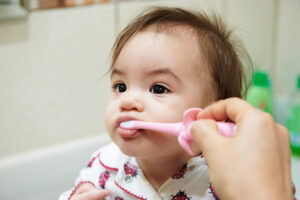 Your baby will probably get their first tooth some time during their first year. You might notice:
Your baby will probably get their first tooth some time during their first year. You might notice:
- your baby's gum is sore and red where the tooth is coming through
- one cheek is flushed
- they are rubbing their ear
- your baby is dribbling more than usual
- they are gnawing and chewing on things a lot
- they are more fretful than usual.
Teething can be unsettling for babies but there are ways to make it easier for them.
You know your baby best but if you have concerns contact your local health visitor or speak to your dentist.
It’s important to start brushing once your baby’s teeth start to come through. Use a baby toothbrush with a tiny smear of fluoride toothpaste. Don't worry if you don't manage to brush much at first. The important thing is to get your baby used to brushing their teeth as part of their daily routine.
NHS dental treatment is free for children until the age of 18 and for pregnant women and those who have had a baby in the last 12 months. You can make your baby's first appointment at the dentist when they are six-months-old.
The Oral Health Team has put together a short presentation on baby's teeth, what to expect and how to look after them.
Useful resources
- For tips to help you look after your baby’s teeth visit NHS.uk.
- Find your nearest NHS dentist on NHS.uk.
- The British Society of Paediatric Dentistry has some great 'Supertooth' videos with Dr Ranj to help make teeth brushing fun.
Page last reviewed: 01/01/2025, next review due: 01/01/2028